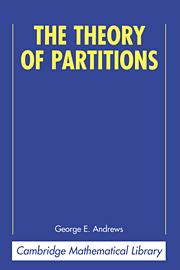Book contents
- Frontmatter
- Editor's Statement
- Contents
- Preface to Paperback Edition
- Preface
- Chapter 1 The Elementary Theory of Partitions
- Chapter 2 Infinite Series Generating Functions
- Chapter 3 Restricted Partitions and Permutations
- Chapter 4 Compositions and Simon Newcomb's Problem
- Chapter 5 The Hardy–Ramanujan–Rademacher Expansion of p(n)
- Chapter 6 The Asymptotics of Infinite Product Generating Functions
- Chapter 7 Identities of the Rogers–Ramanujan Type
- Chapter 8 A General Theory of Partition Identities
- Chapter 9 Sieve Methods Related to Partitions
- Chapter 10 Congruence Properties of Partition Functions
- Chapter 11 Higher–Dimensional Partitions
- Chapter 12 Vector or Multipartite Partitions
- Chapter 13 Partitions in Combinatorics
- Chapter 14 Computations for Partitions
- Index for Definitions of Symbols
- Author Index
- Subject Index
Preface
Published online by Cambridge University Press: 10 February 2010
- Frontmatter
- Editor's Statement
- Contents
- Preface to Paperback Edition
- Preface
- Chapter 1 The Elementary Theory of Partitions
- Chapter 2 Infinite Series Generating Functions
- Chapter 3 Restricted Partitions and Permutations
- Chapter 4 Compositions and Simon Newcomb's Problem
- Chapter 5 The Hardy–Ramanujan–Rademacher Expansion of p(n)
- Chapter 6 The Asymptotics of Infinite Product Generating Functions
- Chapter 7 Identities of the Rogers–Ramanujan Type
- Chapter 8 A General Theory of Partition Identities
- Chapter 9 Sieve Methods Related to Partitions
- Chapter 10 Congruence Properties of Partition Functions
- Chapter 11 Higher–Dimensional Partitions
- Chapter 12 Vector or Multipartite Partitions
- Chapter 13 Partitions in Combinatorics
- Chapter 14 Computations for Partitions
- Index for Definitions of Symbols
- Author Index
- Subject Index
Summary
Let us begin by acknowledging that the word “partition” has numerous meanings in mathematics. Any time a division of some object into subobjects is undertaken, the word partition is likely to pop up. For the purposes of this book a “oartition of n” is a nonincreasing finite sequence of positive integers whose sum is n. We shall extend this definition in Chapters 11, 12, and 13 when we consider higher-dimensional partitions, partitions of n-tuples, and partitions of sets, respectively. Compositions or ordered partitions (merely finite sequences of positive integers) will be considered in Chapter 4.
The theory of partitions has an interesting history. Certain special problems in partitions certainly date back to the Middle Ages; however, the first discoveries of any depth were made in the eighteenth century when L. Euler proved many beautiful and significant partition theorems. Euler indeed laid the foundations of the theory of partitions. Many of the other great mathematicians – Cayley, Gauss, Hardy, Jacobi, Lagrange, Legendre, Littlewood, Rademacher, Ramanujan, Schur, and Sylvester-have contributed to the development of the theory.
There have been almost no books devoted entirely to partitions. Generally the combinatorial and formal power series aspects of partitions have found a place in older books on elementary analysis (Introductio in Analysin Infinitorum by Euler, Textbook of Algebra by Chrystal), in encyclopedic surveys of number theory (Niedere Zahlentheorie by Bachman, Introduction to the Theory of Numbers by Hardy and Wright), and in combinatorial analysis books (Combinatory Analysis by MacMahon, Introduction to Combinatorial Analysis by Riordan, Combinatorial Methods by Percus, Advanced Combinatorics by Comtet).
- Type
- Chapter
- Information
- The Theory of Partitions , pp. xv - xviPublisher: Cambridge University PressPrint publication year: 1984

